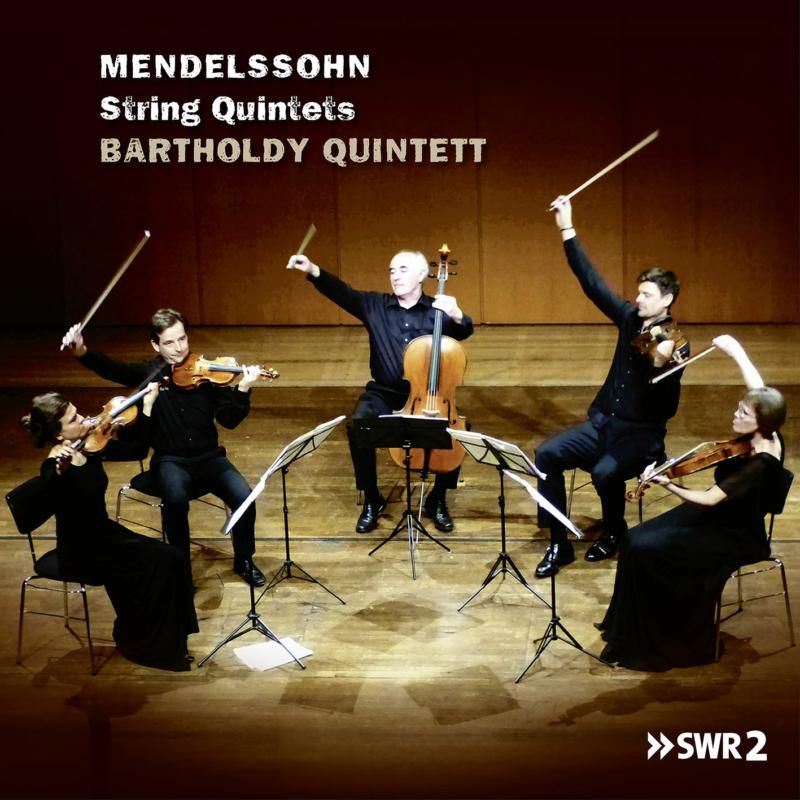MENDELSSOHN String Quintets (Bartholdy Quintett)
View record and artist detailsRecord and Artist Details
Genre:
Chamber
Label: Avi Music
Magazine Review Date: 09/2021
Media Format: CD or Download
Media Runtime: 65
Mastering:
DDD
Catalogue Number: AVI8553030

Tracks:
| Composition | Artist Credit |
|---|---|
| String Quintet No. 1 |
Felix Mendelssohn, Composer
Bartholdy Quartet |
| String Quintet No. 2 |
Felix Mendelssohn, Composer
Bartholdy Quartet |
Author: Amy Blier-Carruthers
This album offers a stirring and refreshing journey through the lights and shades of Mendelssohn’s lyrical and ethereal quintets. The Bartholdy Quintet create a characterful and engaging atmosphere, producing a live and present sound, with Gustav Rivinius’s cello front and centre, and the antiphonal volleys of melody being batted back and forth over the top, like an elegant and elfin Wimbledon match.
There is something of the orchestral in the textures of Op 18, as well as virtuoso twists and flourishes in the upper melodies, which are likely due to the capabilities of Mendelssohn’s friend and violin teacher Eduard Rietz, for whom the Op 20 Octet was written only half a year before. Rietz’s abilities are clearly embedded in this writing, and the Bartholdy achieve this combination of ensemble heft and dazzling pyrotechnics admirably, including some stunning fireworks from viola players Barbara Westphal and Volker Jacobsen along the way.
The Intermezzo is a lyrical and emotional focal point, written to replace the original Minuetto when Mendelssohn heard of Rietz’s death at the age of 29. Few stylish violinists these days can resist a couple of portamentos in the opening moments of this plaintive movement but Ulf Schneider here goes for a fuller Joachim-inspired treatment (as does Anke Dill later on), which I really appreciate. (They also include a premiere recording of the original Minuetto of Op 18, from the Henle Urtext edition.)
In the fast and dramatic fugue, they achieve unity of tone and attack when it comes to this ‘elfin scherzo’ style for which Mendelssohn is known, a texture described by Goethe as ‘eternal whirling and turning’, and by Mendelssohn’s sister Fanny as to be played ‘with the quickness of lightning’, which the Bartholdy certainly achieve.
It is also relevant to relate Op 87 to a violinist and a sound world. In the Leipzig of 1846 where Mendelssohn was director of the orchestra and founder of the Conservatoire, the Joachim link can’t be ignored. This violinist is central to the Romantic tradition: Schumann and Brahms both wrote concertos for him. Mendelssohn took him under his wing at an early age, arranging his tuition and conducting his London debut, and we have recorded evidence of his playing of Brahms and Bach from 1903 – what better treasure for audiophiles interested in the sound of the past? Amy Fay, pupil of Liszt and avid follower of Joachim’s concerts, described his playing as ‘so free’, ‘exquisitely pathetic’, with ‘so many shades’, possessing ‘fire’ and ‘amazing power’. I can hear echoes of this in the Bartholdy’s playing of Op 87, which variously moves between brash and romping, to sweet and lyrical, through solemn and lugubrious territory and back to fiery, driven and stormy. This is the kind of performance I’d equally like to hear live – risk-taking, lyrical and fully committed.
Discover the world's largest classical music catalogue with Presto Music.

Gramophone Digital Club
- Digital Edition
- Digital Archive
- Reviews Database
- Full website access
From £8.75 / month
Subscribe
Gramophone Full Club
- Print Edition
- Digital Edition
- Digital Archive
- Reviews Database
- Full website access
From £11.00 / month
Subscribe
If you are a library, university or other organisation that would be interested in an institutional subscription to Gramophone please click here for further information.




